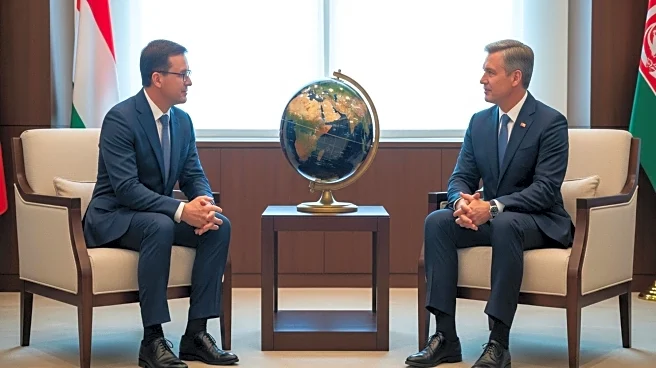What's Happening?
President Donald Trump hosted Pakistan's Prime Minister, Shehbaz Sharif, at the White House, marking a significant step in improving U.S.-Pakistan relations. The meeting, held on the sidelines of the U.N. General Assembly, focused on strategies to end the Israel-Hamas conflict in Gaza. Relations between the U.S. and Pakistan have strengthened as Trump's ties with Indian Prime Minister Narendra Modi have become strained due to India's increased purchases of Russian oil. The U.S. imposed tariffs on India to exert economic pressure on Moscow. Meanwhile, the U.S. and Pakistan have reached a trade agreement to develop Pakistan's oil reserves and reduce tariffs. During the meeting, Sharif praised Trump for his leadership in facilitating a ceasefire with India and invited American companies to invest in Pakistan's sectors such as agriculture and energy.
Why It's Important?
The warming relations between the U.S. and Pakistan could have significant geopolitical implications, particularly in South Asia. Improved ties may lead to increased economic collaboration, benefiting both nations through trade and investment opportunities. For Pakistan, this could mean enhanced development of its oil reserves and growth in sectors like agriculture and technology. For the U.S., strengthening ties with Pakistan could provide strategic advantages in counterterrorism efforts and regional stability. However, the strained relationship with India poses challenges, as India is a key U.S. ally in the region. The tariffs imposed on India could impact bilateral trade and diplomatic relations, potentially affecting U.S. interests in Asia.
What's Next?
Future developments may include further negotiations between the U.S. and India to resolve trade barriers, as indicated by Trump's recent statements. Additionally, the U.S. may continue to explore investment opportunities in Pakistan, fostering economic growth and strengthening bilateral ties. The geopolitical dynamics in South Asia will likely evolve as the U.S. navigates its relationships with both Pakistan and India, balancing strategic interests and economic partnerships.
Beyond the Headlines
The evolving U.S.-Pakistan relationship highlights broader geopolitical shifts, including the impact of global oil politics and regional security concerns. The U.S.'s approach to managing its alliances in South Asia reflects the complexities of international diplomacy, where economic interests and security priorities often intersect. The situation underscores the importance of strategic diplomacy in maintaining regional stability and addressing global challenges.








